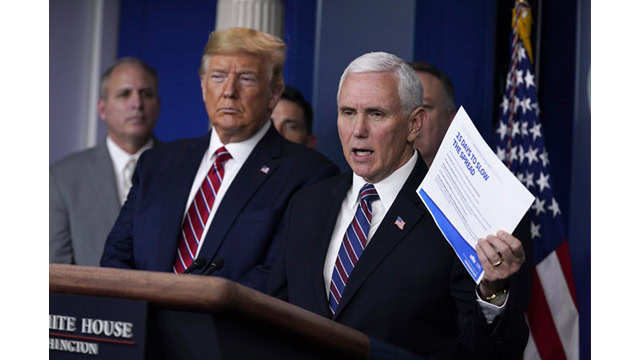TRSA Briefs Office of VP Pence on the Importance of Reusable HCTs

TRSA President & CEO Joseph Ricci and Vice President of Government Relations & Certifications Kevin Schwalb briefed Steve Pinkos, deputy assistant to the president and deputy national security advisor to the vice president, on Friday, April 17, regarding the importance of establishing a balanced supply chain to mitigate shortages of healthcare PPE (personal protective equipment), including the use of hygienically clean reusable healthcare contact textiles (HCTs) such as isolation and surgical gowns, scrubs and other PPE.
“The industry will continue providing critical reusable PPE, such as isolation and surgical gowns, scrubs and other healthcare contact textiles to protect frontline medical workers and patients, and has the capacity to make up for the shortfall of disposable HCTs,” Ricci said.
After thanking Vice President Mike Pence (R) for recognizing the need for sustainable HCTs during last Thursday’s daily Coronavirus Task Force media briefing, Ricci highlighted the industry’s capacity to deliver HCTs processed by Hygienically Clean Healthcare Certified laundries and its response to the shortage including the efforts of TRSA supplier members, such as Medline, Standard Textile, Milliken, Dickies, Aramark, 3M and others to manufacture and process more reusable PPE.
“TRSA members supply, launder and maintain nearly 90% of the healthcare contact textiles (HCTs) such as linens, scrubs, isolation and surgical gowns in North America,” Ricci said. “Many are also now serving not only existing healthcare facilities, but the emergency facilities built to handle peak occupancies including convention centers in New York, Detroit and New Orleans. We have been working to deliver hygienically clean and safe reusable HCTs due to the shortages of disposable alternatives.”
Both sides agree another shortage is likely with the return of elective surgeries, opening of outpatient centers and medical offices across the country as the economy re-opens. When asked how the industry could help overcome these shortages, Schwalb stated that “requiring healthcare facilities to use and inventory a more balanced supply chain including at least 50 percent reusable HCTs” would stimulate manufacturers to begin producing more of the sustainable, reusable PPE. “We haven’t seen this level of shortages globally, as they typically use a better balance of both reusable and disposable products,” Ricci said. “In the U.S., the market is dominated by less sustainable disposable products with nearly 90 percent of HCTs being disposable; globally the balance is closer to 50/50 reusable to disposable.
“Our industry’s capacity to process hygienically clean, reusable HCTs provide a more sustainable, secure supply chain that could withstand demand fluctuations of the healthcare community while providing the same protection offered by disposable alternatives,” Ricci said.
TRSA asked that Vice President Pence continue to highlight the safety and sustainability of reusable HCTs and recommended incentivizing healthcare centers to increase usage and inventories of HCTs processed by Hygienically Clean Healthcare certified laundries by asking the U.S. Centers for Disease Control and Prevention (CDC) and the Centers for Medicare & Medicaid Services (CMS) to require for reimbursement the utilization of a minimum use of at least 50% of reusable HCTs to mitigate any future demand of healthcare contact textiles.
Pinkos thanked the industry for the extraordinary work it is doing in keeping the critical infrastructure workforce and the country safe and moving. TRSA will continue to communicate and work with the Office of the Vice President and the Recovery Task Force to minimize future shortages by establishing a more diverse supply chain including reusable HCTs made in the United States.
